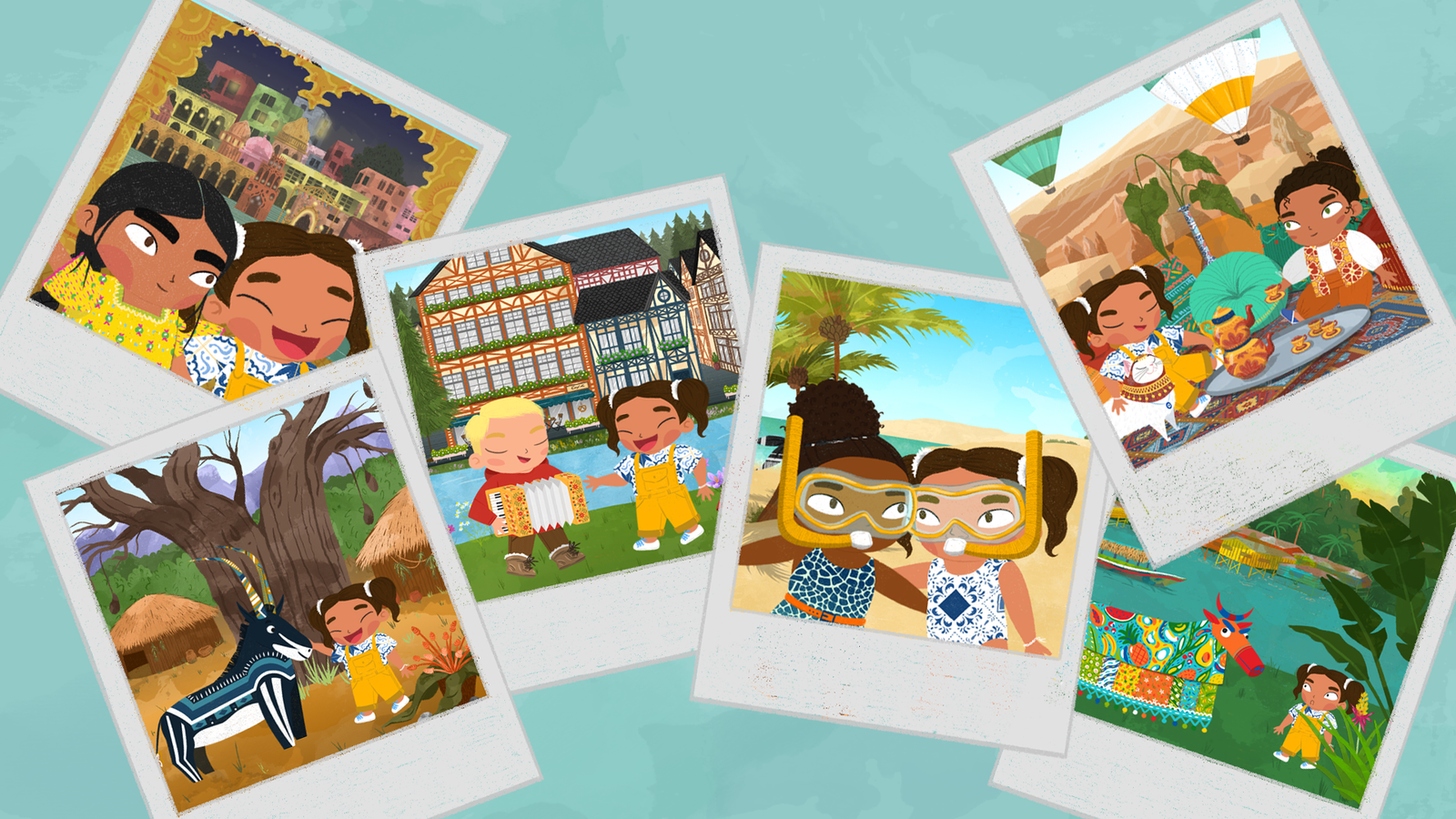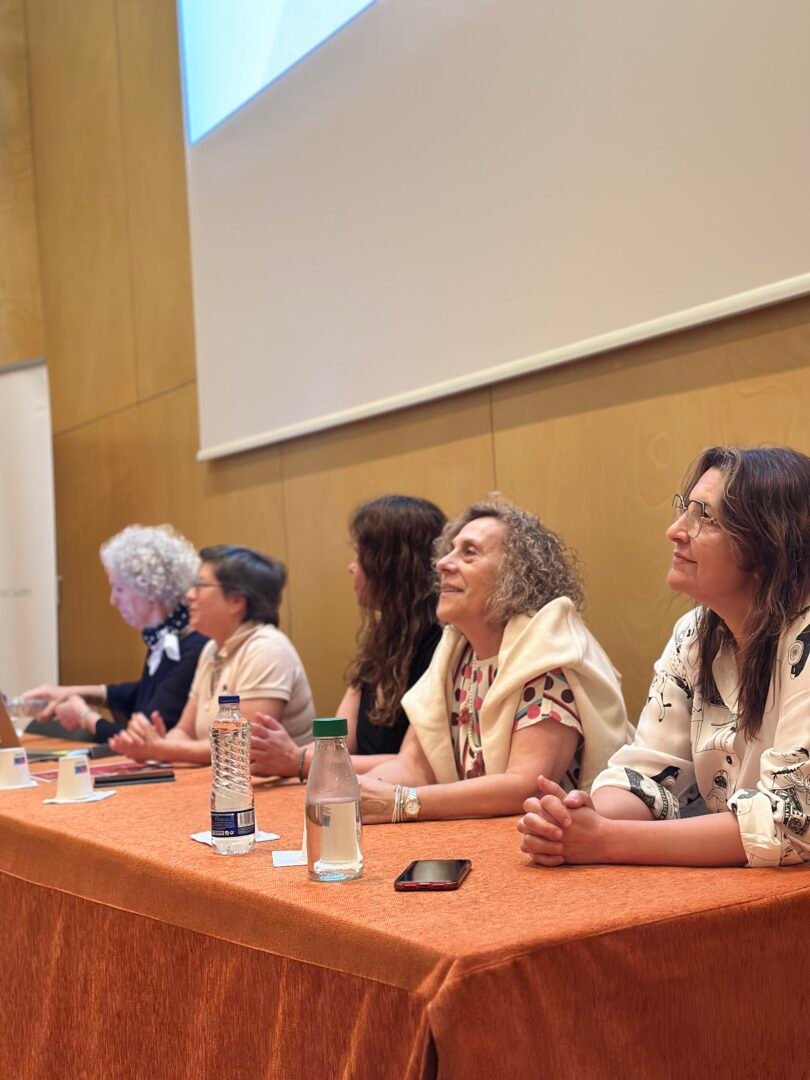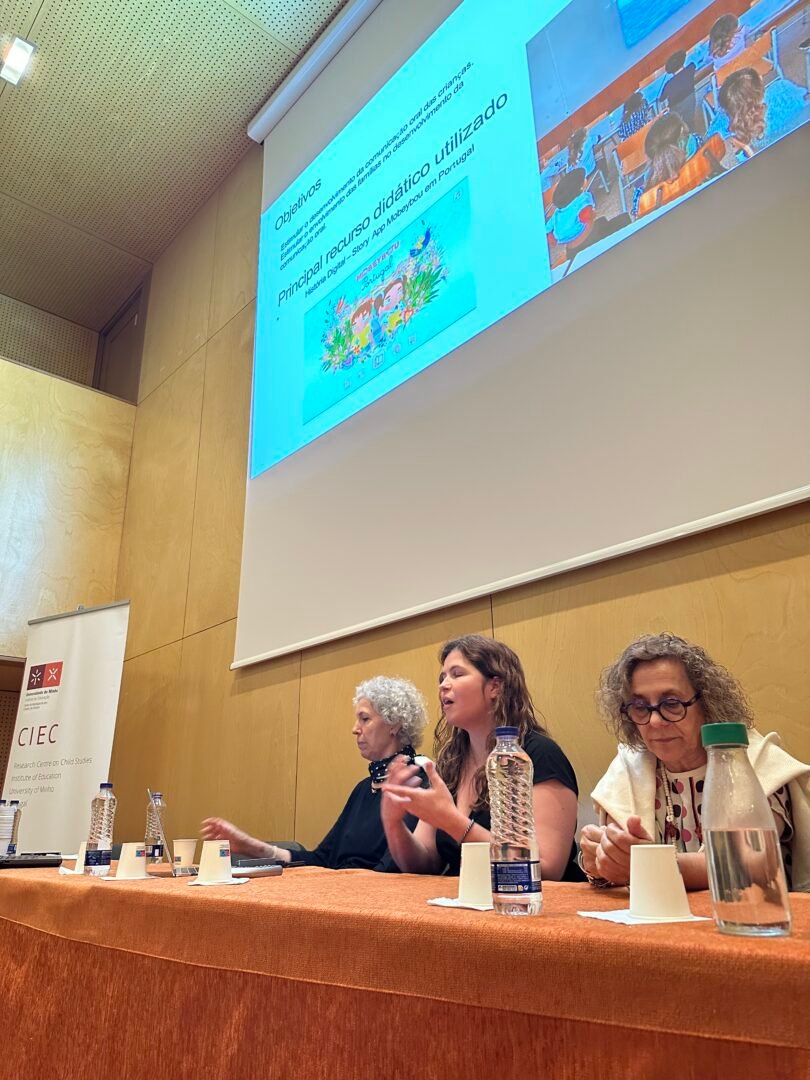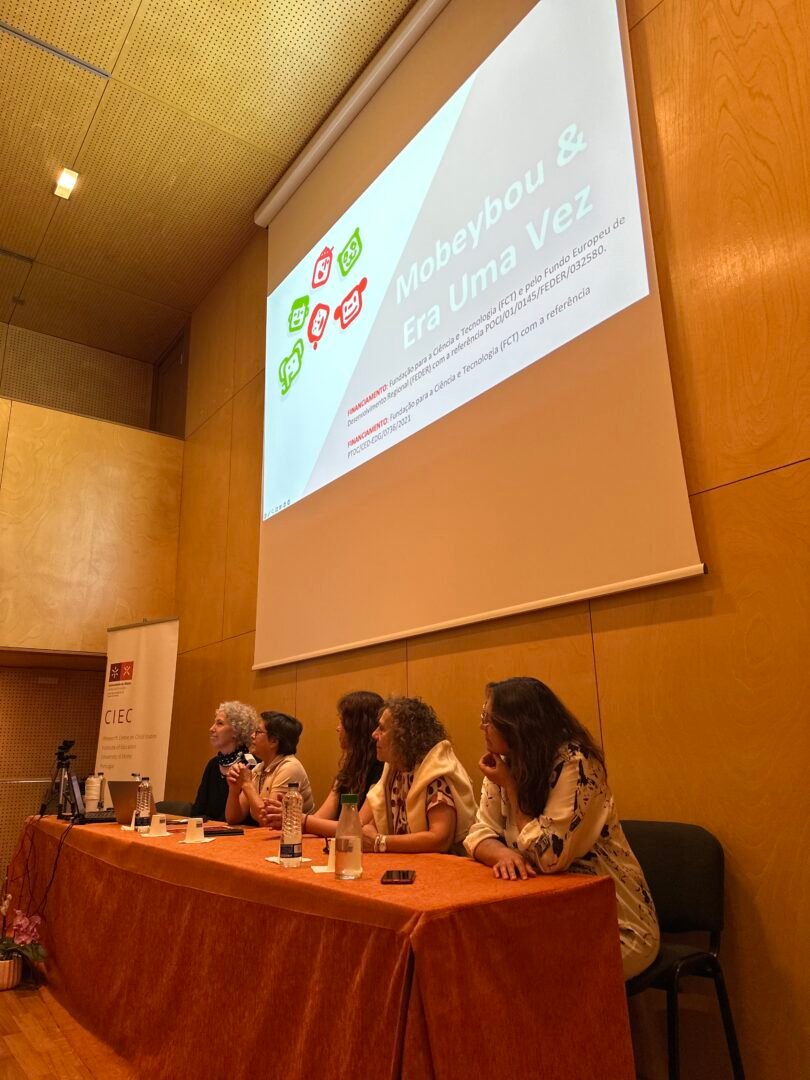Congratulations to Juliana Félix
For completing her Master’s Degree in Pre-School Education and Primary Education, with the title: ‘The Role of Digital Resources in the Development of Communication Skills in Pre-School and Primary Education’.

Moving Beyond Boundaries – Narrative Learning in the Digital Era
Congratulations to Juliana Félix
For completing her Master’s Degree in Pre-School Education and Primary Education, with the title: ‘The Role of Digital Resources in the Development of Communication Skills in Pre-School and Primary Education’.
Presenting the project “Once Upon a Time…” at CIEC’s Day!
We were delighted to host Filipa Andrade, Juliana Félix and Carla Barbosa, who gave a testimonial about their work with the #Mobeybou Materials
We were delighted to have Dr. Filipa Andrade (Early Childhood Educator at EB No. 2 in Vila Verde), and Dr. Juliana Félix (a fellow for the “Once Upon a Time” Project), who shared their experiences working with the Mobeybou materials.



Thank you to everyone who joined us and helped bring stories to life! 💫
We are delighted to share great news. The Reading Observatory has selected the story app Mobeybou in Angola for reading. This organization recommends works by evaluating the quality of the text, illustrations, graphic design, approach to innovative themes, and creativity.https://caminhosdeleitura.pt/sugestoes-de-leitura-2024/: Reading Observatory

On April 4th, we welcomed around 70 3rd cycle and secondary school students to the University of Minho. They participated in the activity ‘Discovering narratives: come and challenge your creativity’. This was part of UPA – UMinho Portas Abertas.
During the session, the students explored the Mobeybou materials. They used digital apps and the StoryMaker. It was a fun journey through the world of story creation and interculturality.
The result was very positive! Between apps, characters, and plots, the students were very involved in this experience. Rodrigo, from Year 9, summed it up well:
‘It’s very easy to create stories and it combines culture and fun very well.’
The teachers who accompanied the classes were delighted. They said they would continue to work with the materials in class.

No passado dia 4 de abril, recebemos cerca de 70 alunos do 3.º ciclo e do Ensino Secundário na Universidade do Minho para a atividade “À descoberta das narrativas: vem desafiar a tua criatividade”, integrada no UPA — UMinho Portas Abertas.
Durante a sessão, os alunos exploraram os materiais Mobeybou — desde as apps digitais ao StoryMaker — numa viagem divertida pelo mundo da criação de histórias e da interculturalidade. A atividade foi dinamizada pela investigadora Cristina Sylla, com as bolseiras Andreia Couto e Linda Ferreira, no âmbito do projeto Era uma Vez.
O resultado foi muito positivo! Entre apps, personagens e enredos, os alunos ficaram muito envolvidos nesta experiência. O Rodrigo, do 9º ano, resumiu bem:
“É muito fácil de criar histórias e combina muito bem a cultura e a diversão.”
Também as professoras que acompanharam as turmas ficaram encantadas e disseram que vão continuar a trabalhar com os materiais nas aulas.





Andreia Couto presented the conceptualisation of our concept: Converged Playful Learning. This occurred at the II International Conference on Child Studies. The conference was held at the University of Santiago de Compostela (Spain). The concept of Converged Playful Learning arose from observations conducted in Filipa Andrade’s classroom. These observations were with children aged 3 to 5. This concept combines technology and pedagogical experiences, promoting meaningful learning through play and interaction.
Thanks to Andreia for her excellent presentation. We appreciate all the participants for sharing and reflecting, which enriched our approach!

A Andreia Couto apresentou a conceptualização do nosso conceito: Converged Playful Learning, no II International Conference on Child Studies, realizado na Universidade de Santiago de Compostela (Espanha). O conceito: Converged Playful Learning resultou das observações realizadas na sala da Educadora Filipa Andrade com crianças de 3 a 5 anos. Este conceito une tecnologia e experiências pedagógicas, promovendo aprendizagens significativas através do brincar e da interação.
Obrigada Andreia Couto pela excelente apresentação e a todos os participantes pelas partilhas e reflexões que enriqueceram a nossa abordagem!


Innovation in early childhood education can be achieved through the use of tools that combine technology with interactivity. Children from a Portuguese kindergarten explored the city of São Paulo. They used the Mobeybou materials to learn about it in a unique way.
This activity emerged from exploring the 4th episode of the Story App Mobeybou in Brazil. It focused on Avenida Paulista and used the 360º feature of Mobeybou. The environment was earlier prepared with a projector and a large fabric screen. On this screen, the narrative of São Paulo was projected. This setting allowed the children to virtually immerse themselves in this city.
The 360º functionality allowed the children to ‘visit’ Avenida Paulista virtually. They observed details from the architecture. They also noticed the hustle and bustle of daily life and the predominant sounds of the area. After this moment of exploration, the children co-constructed knowledge among peers with the Educator’s appropriate mediation. Then, a practical activity challenge emerged. Using building blocks and other materials available in the classroom, the children constructed their collective representation of Avenida Paulista. They applied what they had learned and explored virtually with the StoryApp Mobeybou in Brazil.
The StoryApp proved to be an excellent tool to support educational practice. It facilitated the achievement of the educational objectives that the Educator had for this session. These objectives included developing observation skills, promoting decision-making, and fostering cooperation. Additionally, the materials helped the children understand the culture and architecture of São Paulo. They valued the importance of cultural preservation. These experiences highlighted the diversity of a metropolis.
Mobeybou materials, merged with an educational approach focused on interactivity, provided a rich and engaging learning experience. This approach emphasized cultural exploration. These tools stimulated the children’s imagination and creativity. They also equipped them with skills to explore and understand the world around them. The highlights are:

A inovação na educação infantil pode passar pelo uso de ferramentas que combinam tecnologia com interatividade. Num Jardim de Infância de Vila Verde, em Braga, Portugal, um grupo de crianças teve a oportunidade de conhecer e explorar a cidade de São Paulo de uma maneira única, através dos materiais Mobeybou.
Esta atividade surgiu da exploração do 4.º episódio da StoryApp Mobeybou no Brasil – a Avenida Paulista – com recurso ao 360º do Mobeybou. O ambiente, que se encontrava previamente preparado com um projetor e um grande tecido, no qual a narrativa de São Paulo foi projetada, permitiu que as crianças mergulhassem virtualmente nesta cidade.
A funcionalidade de 360º permitiu que as crianças ‘visitassem’ virtualmente a Avenida Paulista, observando detalhes desde a arquitetura, e os sons predominantes do local. Após esse momento de exploração e coconstrução de conhecimento entre pares, com a devida mediação da Educadora, surgiu o desafio de uma atividade prática. Recorrendo a blocos de construção e outros materiais disponíveis em sala, as crianças construíram a sua representação coletiva da Avenida Paulista, aplicando o que aprenderam adquirido e explorado virtualmente com a StoryApp Mobeybou no Brasil.
A StoryApp mostrou ser uma boa ferramenta para auxiliar a prática educativa, facilitando o alcance dos objetivos educativos que a Educadora tinha para essa sessão: desenvolver habilidades de observação, promover a tomada de decisão e a cooperação. Além disso, os materiais ajudaram as crianças a entender e dar um maior valor à cultura e à arquitetura de uma metrópole como São Paulo, enfatizando a importância da preservação cultural e da diversidade.
A combinação dos materiais Mobeybou com uma abordagem educativa focada na interatividade e exploração cultural proporcionou uma experiência de aprendizagem rica e envolvente. Estas ferramentas não apenas estimularam a imaginação e criatividade das crianças, como também as capacitaram com habilidades para explorar e compreender o mundo ao seu redor. Destacam-se:

Join Pedro on this delicious journey through Portuguese culture with a special Fish Cataplana recipe, adapted for the little chefs! 🐟🍅🌶️
Cooking together is a great way to create family memories. It also introduces children to the rich flavors of Portuguese cuisine. 🎉👨🍳👩🍳
Vamos celebrar o Dia da Criança com uma Aventura Culinária!
Juntem-se ao Pedro nesta deliciosa viagem pela cultura portuguesa com uma receita especial de Cataplana de Peixe, adaptada para os pequenos chefes! 🐟🍅🌶️
Cozinhar juntos é uma forma maravilhosa de criar memórias em família e introduzir as crianças aos sabores ricos da culinária portuguesa. 🎉👨🍳👩🍳


👨👩👧👦 #mobeybou #appPortugal #ChildrensDay #CulinaryAdventure #FamilyCooking #PortugueseRecipe #Cataplana #CulturalMoments #CookingWithKids


We are pleased to share the progress and achievements of the MOBEYBOU-OUT project. It has been recognized by ELINET – European Literacy Policy Network as an example of best practices. This recognition highlights the significant impact of our materials. They contribute to the development of digital, linguistic, and intercultural skills in early childhood. Additionally, they help primary education.
We would like to remind you that the MOBEYBOU-OUT project was structured into two crucial phases during its initial implementation:
Mobeybou: Development of Tangible and Digital Materials: During this phase, we developed an innovative digital manipulative and a series of interactive digital narratives. The digital manipulative works with physical blocks that children can use to interact with digital content on a device. Each active block has specific animations that help tell a story, promoting a rich and interactive educational experience.
OUT: Empirical Evaluation: The second phase of the project focused on the practical evaluation of the developed materials. We observed and analyzed how children interacted with the tools and which skills were most influenced by the technology.


The project involved the collaboration of a doctoral student from the Federal University of Paraná (UFPR), Brazil, and eight master’s students from various Portuguese universities, covering fields such as Electronics, Design, Communication, and Education. The impact and success of MOBEYBOU were recognized by ELINET – European Literacy Policy Network. This recognition represents a significant milestone in the development of educational resources tailored to the contemporary needs of children.
We remain committed to innovation and excellence in early childhood education. Follow our blog for more updates and news about the OUT project!

É com grande satisfação que compartilhamos os progressos e conquistas do projeto MOBEYBOU, que foi reconhecido pela ELINET – European Literacy Policy Network como um exemplo de boas práticas.
Este reconhecimento veio destacar o impacto significativo dos nossos materiais no desenvolvimento das competências digitais, linguísticas e interculturais em crianças da educação infantil e do primeiro ciclo do ensino básico.
Recordamos que o projeto MOBEYBOU foi estruturado em duas fases cruciais, aquando da sua implementação inicial:
Mobeybou: Desenvolvimento de Materiais Tangíveis e Digitais: Durante esta fase, desenvolvemos um manipulador digital e uma série de narrativas digitais interativas. O manipulador digital funcionava com blocos físicos que as crianças poderiam usar para interagir com os conteúdos digitais no dispositivo digital. Cada bloco ativo tem animações específicas que ajudam a contar uma história, promovendo uma experiência educativa rica e interativa.
OUT: Avaliação Empírica: A segunda fase do projeto focou a avaliação prática dos materiais desenvolvidos, onde observamos e analisamos como as crianças interagiam com as ferramentas e quais competências eram mais influenciadas pela tecnologia.
O projeto contou com a colaboração de um estudante de doutoramento da Universidade Federal do Paraná (UFPR), Brasil, e oito alunos de mestrado de várias universidades portuguesas, abrangendo áreas como Eletrônica, Design, Comunicação e Educação. O impacto e o sucesso do MOBEYBOU foram reconhecidos pela ELINET – European Literacy Policy Network.
Este reconhecimento representou um marco significativo no desenvolvimento de recursos educacionais adaptados às necessidades contemporâneas das crianças. Continuamos comprometidos com a inovação e a excelência na educação infantil. Acompanhe nosso blog para mais atualizações e novidades sobre o projeto OUT!

We are happy to share that our seminar/workshop on Digital literacy, multimodality and interculturality in the school curriculum: theories and practices mediated by a storytelling toolkit received 61 registrations and it will take place every Thursday, starting on January 2023 until May 2023.
Temos o prazer de partilhar que a nossa oficina de formação acreditada sobre literacia digital, multimodalidade e interculturalidade no currículo escolar: teorias e práticas mediadas por um conjunto de ferramentas de narração de histórias recebeu 61 inscrições e terá lugar todas as quintas-feiras, de Janeiro de 2023 até Maio de 2023. Follow us on Instragam and Facebook
BEST APP The Mobeybou apps integrated the three finalists for BEST APP at the comKids festival, one of the most relevant festivals on digital media (presentation here)

In the scope of her Master Venicy has carried out field work in Cape Verde with the Mobeybou in Cape Verde app. She took these wonderful photos with young children from a local kindergarten!

